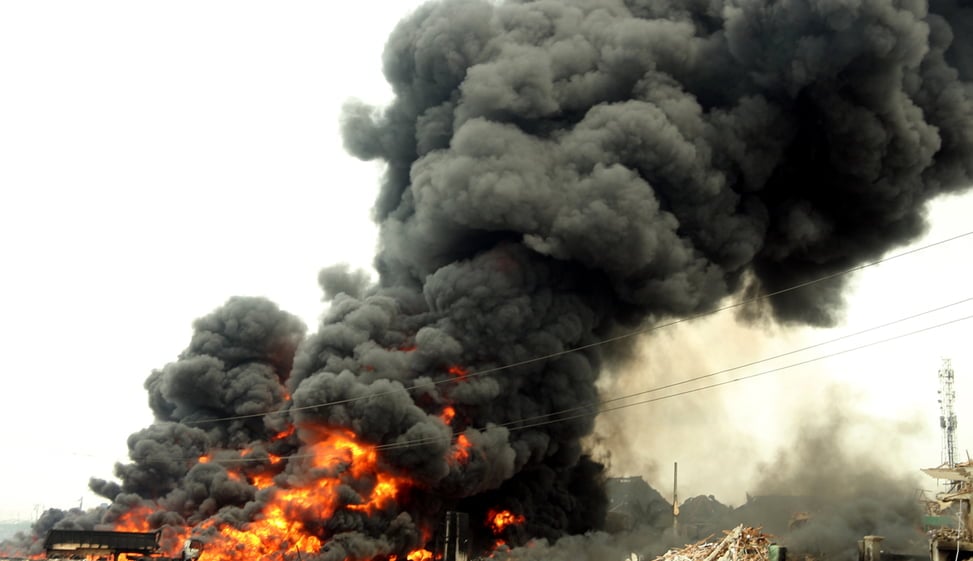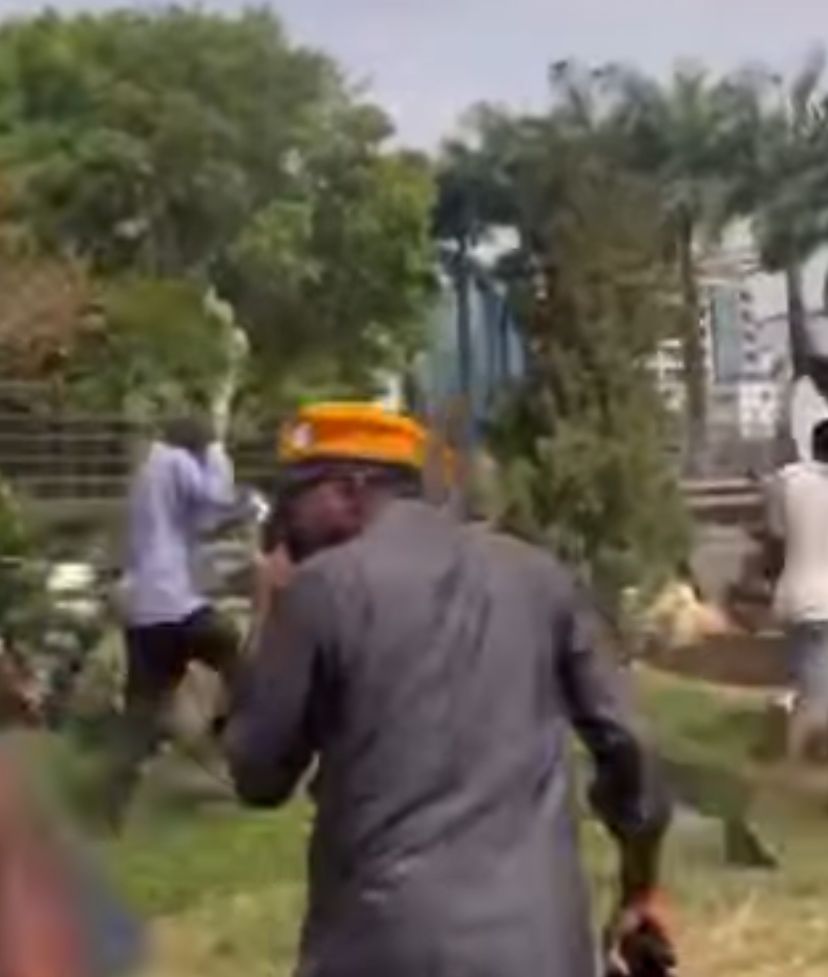Trending
Israel renews orders for Palestinians to leave northern Gaza
Published
6 months agoon
By
Ekwutos BlogThe Israeli military on Saturday renewed its orders for Palestinians in the northern Gaza Strip to leave their homes and shelters as troops continue their weeklong offensive against militants.
Avichay Adraee, a spokesman for the Israeli military, told people living in the targeted area that they should head south to Muwasi, a packed area in southern Gaza designed by the military as a humanitarian zone.
The military also ordered the three main hospitals in northern Gaza to evacuate patients and medical staff.
Most of the fighting in the past week was centred in and around Jabaliya, the largest refugee camp in the Gaza Strip. The area was pounded by Israeli war jets and artillery. Residents there said they have been trapped inside their homes and shelters.
No food aid for Gaza since 1 October
The United Nations food agency said on Saturday that no food aid had entered northern Gaza since 1 October.
The World Food Program (WFP) said that the primary border crossing into the war-ravaged area had been closed for about two weeks. The agency also warned that Israel’s ongoing ground operation will have a disastrous impact on food security for thousands of Palestinian families there.
“The north is basically cut off and we’re not able to operate there,” said Antoine Renard, the WFP country director of Palestinian territories.
Concerns of a hunger crisis have risen in Gaza roughly a month after a UN independent investigator on the right to food accused Israel of carrying out a “starvation campaign” against Palestinians.
Israel has denied such allegations and insisted that it has allowed food and other aid into Gaza in significant quantities.
“Israel has not halted the entry or coordination of humanitarian aid entering from its territory into the northern Gaza Strip. As evidence, humanitarian aid coordinated by COGAT and international organisations will continue to enter the northern Gaza Strip in the coming day as well,” COGAT, the Israeli military body overseeing aid distribution, said in a statement on Wednesday.
The WFP said its food distribution points, as well as kitchens and bakeries in northern Gaza, have been forced to shut down due to airstrikes, military ground operations and evacuation orders.
It said that the only functioning bakery in North Gaza, supported by WFP, caught fire after being hit by an explosive munition.
The WFP said its last remaining food supplies in the north — including canned food, wheat flour, high-energy biscuits, and nutrition supplements — have been distributed to shelters, health facilities and kitchens in Gaza City and three shelters in the northern areas.
It is unclear how long these limited food supplies will last, warning that the consequences for fleeing families will be dire if the escalation continues.
Israel’s offensive in Gaza has killed over 42,000 Palestinians, according to local health authorities, who do not say how many were fighters but say women and children make up more than half of the fatalities.
The war has destroyed large areas of Gaza and displaced about 90% of its population of 2.3 million people, often multiple times.
Death toll rises in Lebanon
The speaker of Iran’s parliament on Saturday toured the scene of an Israeli airstrike in Beirut that killed and wounded dozens. He vowed that Tehran would keep supporting Lebanese and Palestinians fighting against Israel.
Mohammad Bagher Qalibaf visited the area struck after holding talks with caretaker Prime Minister Najib Mikati, who said that Lebanon’s priority now was to work toward a ceasefire.
His office said that Lebanon’s government still abides by a 2006 UN Security Council Resolution approved at the end of a 34-day war between Israel and Hezbollah, and was prepared to boost Lebanese army presence along the country’s border with Israel.
It was the second visit by an Iranian official to Beirut in recent days after the country’s foreign minister visited Lebanon earlier this month.
Iran is a main backer of Lebanon’s Hezbollah group, which suffered major setbacks in recent weeks as well as the killing of its leader Hassan Nasrallah.

Iran’s parliament speaker Mohammad Bagher Qalibaf visits the site of Thursday’s Israeli airstrike in Beirut, Lebanon, on Saturday 12 October, 2024. AP
Lebanese authorities said on Friday that 60 people were killed and 168 wounded in the past 24 hours, raising the total death toll over the past year of conflict between Israel and the militant group to 2,229 dead and 10,380 wounded.
Israel has been escalating its campaign against Hezbollah with waves of heavy airstrikes across Lebanon and a ground invasion at the border. It comes after a year of exchanges of fire.
Hezbollah started attacking Israeli army posts in October last year in solidarity with the militant Hamas group in Gaza. Since 23 September, Israel has intensified its airstrikes and forced the displacement of hundreds of thousands of Lebanese.
Last week, Israel began a ground invasion of Lebanon, leading to clashes along the border with Hezbollah fighters.
Islamic State camps in Syria hit by US airstrikes
The US military said it conducted a series of airstrikes against multiple camps in Syria belonging to the so-called Islamic State (ISIS) group.
US Central Command said the strikes on Friday will “disrupt the ability of ISIS to plan, organise and conduct attacks against the United States, its allies and partners, and civilians throughout the region and beyond.”
It said battle damage assessments were underway and did not include civilian casualties.
There are some 900 US forces in Syria, along with an undisclosed number of contractors, mostly trying to prevent any comeback by the extremist IS group, which swept through Iraq and Syria in 2014, taking control of large swaths of territory.
You may like


We are in control of NNPP – Kwankwaso’s loyalists snub court ruling


FAAN ends physical luggage checks at Lagos Airport


IMO DEPUTY SPEAKER, IWUANYANWU DONATES 500 CAPACITY TOWN HALL BUILDING TO NWANGELE COMMUNITY, SALUTES GOV. UZODIMMA FOR ENABLING PROJECTS EXECUTION


Someone gave me 300k to keep for him since August last year, Atanda, Yesterday i received a message from him on WhatsApp that i should pls send 70k to a particular acc0unt he provided and i did just as he instructed and shared him the receipt.


Ayuba Umar slams Nasarawa govt over 3-day Abuja retreat


Wike, others planning extend Rivers six months emergency rule – Suspended Commissioner, Gbali
Trending
Lagos: Cause of Ijora-Badia explosion revealed
Published
6 hours agoon
April 7, 2025By
Ekwutos Blog
Lagos State Fire and Rescue Service has revealed the real cause of the explosion that rocked the Ijora-Badia area of Lagos on Sunday afternoon, injuring no fewer than 15 people.
According to a statement by the Director of the Lagos State Fire and Rescue Service, Margaret Adeseye, the explosion occurred around 4:10 p.m. inside a mini shop stocked with 25kg gas cylinders.
The shop, located within a bungalow that housed 15 self-contained rooms and seven other shops, reportedly had five gas cylinders at the time of the incident.
Adeseye attributed the explosion to the mishandling of gas, which caused a leak that was ignited by a nearby flame.
“It was a case of poor handling of gas products, which unfortunately allowed gas to escape and come in contact with a flame. This triggered the explosion,” she confirmed.
The resulting fire, she said, was promptly extinguished by a team of firefighters from the Sari Iganmu Fire Station, with support from the Lagos State Emergency Management Agency, LASEMA, the Lagos Neighbourhood Safety Corps, and LASAMBUS.
While no fatalities were recorded, 15 persons sustained varying degrees of burn injuries.
Adeseye noted that several victims were treated with first aid on-site, while others were taken to nearby hospitals for further medical care.
She also assured residents that the area has since been secured and normalcy restored.
Trending
Take-It-Back protesters scamper for safety as police fire tear gas during protest in Abuja.
Published
6 hours agoon
April 7, 2025By
Ekwutos Blog
Officers of the Nigeria Police Force dispersed protesters with tear gas in the Maitama area of Abuja.
The protesters, who had gathered on Monday, April 7, scattered in different directions as the tear gas canisters were fired in their midst.
The protest is part of a nationwide demonstration spearheaded by the Take-It-Back Movement and other civil society organisations.
Key among the concerns raised by the organisers are the alleged misuse of the Cybercrime Act, the worsening economic hardship in the country, and what they described as a “state of emergency” in Rivers State.
The demonstrators carried placards bearing inscriptions such as “Stop the Repression” and “Let Us Breathe”.
Human rights activist Omoyele Sowore was also present at the protest ground.
Trending
How I caught lots of people’s wives with big men, governors – Ali Baba
Published
7 hours agoon
April 7, 2025By
Ekwutos Blog
Veteran Nigerian comedian, Ali Baba, has revealed that he has caught numerous wives of his friends and associates engaging in extramarital affairs with governors and wealthy politicians.
He made this revelation during an appearance on the Outside the Box podcast.
Speaking candidly about the unsavoury activities prevalent among the nation’s elite, the comedian recounted a particular encounter in which he saw the wife of an associate at the residence of a state governor.
He said: “I have been in the houses of a lot of big men—like governors and the rest—and I see wives of a lot of people that I know doing things, and I greet, ‘How are you? How is everything?’
“And then those guys would do their philandering, tap her bum and say, ‘Go back inside, I’m not finished with you,’ and she went back inside. Then I ran into her at an event, and her husband said, ‘Oh, how are you? Meet my wife.’ I responded, ‘Oh madam, it’s a pleasure. I haven’t seen you in five years. Where have you been?’ And she’s like, ‘I’ve been around, good to see you.’
“When she sees me somewhere after, she calls me and says, ‘Ali, thanks,’ I say, ‘It’s okay.’”
Ali Baba’s account casts a sharp light on the often unspoken indiscretions that occur behind closed doors in high society.
Credit: Blaze 91.5 FM

We are in control of NNPP – Kwankwaso’s loyalists snub court ruling

FAAN ends physical luggage checks at Lagos Airport

IMO DEPUTY SPEAKER, IWUANYANWU DONATES 500 CAPACITY TOWN HALL BUILDING TO NWANGELE COMMUNITY, SALUTES GOV. UZODIMMA FOR ENABLING PROJECTS EXECUTION
Trending

 Trending6 months ago
Trending6 months agoNYA demands release of ‘abducted’ Imo chairman, preaches good governance
- Business6 months ago
US court acquits Air Peace boss, slams Mayfield $4000 fine

 Politics6 months ago
Politics6 months agoMexico’s new president causes concern just weeks before the US elections
- Entertainment6 months ago
Bobrisky transferred from Immigration to FCID, spends night behind bars
- Entertainment6 months ago
Bobrisky falls ill in police custody, rushed to hospital

 Politics6 months ago
Politics6 months agoRussia bans imports of agro-products from Kazakhstan after refusal to join BRICS

 Politics6 months ago
Politics6 months agoPutin invites 20 world leaders
- Politics1 year ago
Nigerian Senate passes Bill seeking the establishment of the South East Development Commission.

